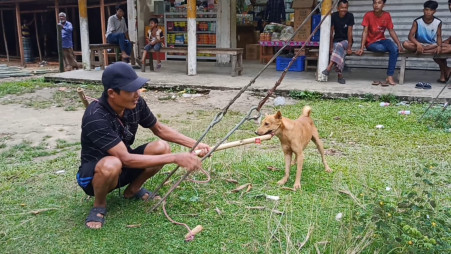Dogs being trafficked to India
Bangladeshi authorities are completely unaware of the stray and pet dog smuggling

Dogs are being trafficked from bordering Cumilla, Feni, Chattogram, Cox's Bazar and two Chattogram Hill Tracts districts to live animal markets in the Indian states of Mizoram and Nagaland.
India's Mizo and Kuki ethnic people allegedly sneak into Bangladesh, hunt stray and even pet dogs here and traffic them to Indian markets where each of the animals is worth Rs6,000-7,000, said local people of Rangamati.
The Business Standard has obtained some photos and videos that show the ethnic people were hunting the animal in Khagrachari's Dighinala area in October this year.
Two ethnic youths captured several dogs using locally made traps. Mouths of the animals were tied by wire after the hunt. Besides, bamboo would be tied around the neck so that the dogs cannot run away, shows the videos.
Ovi Barua, a Dighinala local who witnessed the hunt, told The Business Standard that ethnic people in Mizoram and Nagaland consume dog meat, while Bangladesh meets a large portion of the market demand in the two Indian states.
"The ethnic hunters search our markets and neighbourhoods for dogs. They come quite often. We call them 'the Mizos'," said Ovi.
"Nobody stops the Mizos though they hunt dogs very cruelly," he added.
According to the Cruelty to Animals Act 2020, dog culling or hunting for consumption is prohibited in Bangladesh. Any violation of the law can meet with six-month imprisonment and a Tk10,000 fine.
Slaughtering dogs for consumption is prohibited in India too.
Rendezvous Maini Bazar
Ovi said dogs are hunted down in Khagrachari almost every month, and the animals are sold in Mizoram like live chickens and goats.
Noor Mohammad, a resident of Rangamati municipality, also said Indian people capture stray dogs for meat in the hill district regularly. He said he saw a dog-laden launch in Rangamati Fisheries Ghat on 28 September.
Environmental group Save the Nature Chairman Moazzem Hossain said Mizo and Pangkhua people, who live by the Indo-Bangla border, consume dog meat.

"During a field study in remote Rangamati, we met the ethnic people. They told us that there are winter festivals in Mizoram and Nagaland where roasted dog dishes are kind of a tradition," he told TBS.
Hill tracts locals said dogs captured in both Rangamati and Khagrachari are taken to Rangamati's Maini Bazar. From the bazar, the animals are taken to the Thegamukh border and they finally end up in Indian animal markets.
Renowned underwater photojournalist Sharif Sarwar said he was in Rangamati for two months for research. "I found a boat with 20-30 dogs on Kaptai Lake in the Barkal area. The animals were being taken away with their legs and mouths tied."
Quoting the people Sharif met back then, he also confirmed the Rangamati-Thegamukh-Mizoram trafficking route.
Authorities are unaware of it
Barun Kumar Datta, Rangamati district livestock officer, said they do not know about any dog meat trafficking from Bangladesh.
Md Nurul Afsar, Khagrachari district livestock officer, said, "It sounds very cruel if dogs are smuggled for human consumption. The law enforcers are supposed to look into the matter."
According to the Cruelty to Animals Act 2020, which prohibits dog culling and slaughter for consumption, the Department of Livestock Services has been named as the authority to check it.

Colonel Shahidur Rahman Osmani, border guard Rangamati sector commander, told TBS that Bangladesh Border Guard (BGB) has no information on dog meat trafficking to India.
Lt Colonel Assad, BGB south-east region officer, said they will verify whether dogs are being trafficked, and take appropriate measures if it is found to be true.
Local animal rights activists concerned
Mohammad Rashedul Alam, Professor at Chattogram Veterinary and Animal Sciences University (CVASU), said animal welfare groups have been vocal about dog meat trafficking.
Environmentalist Moazzem Hossain pointed the finger at the Department of Livestock Services over its inaction in stopping the trafficking.
Wildlife journalist and conservationist Aminul Islam Mithu said most of the animal welfare initiatives are Dhaka-centric.
Trafficking also disgusts Indian activists
In the face of growing demands by Indian animal rights groups, the Mizoram state government banned slaughtering, import, trade and sale of dog meat in 2020. Nagaland also banned dog meat in July of the same year.
The Business Standard contacted the People for the Ethical Treatment of Animals (Peta), an international organisation for animal rights, to learn why dogs are being trafficked to India even after the ban.
Pradeep Ranjan Doley Barman, Peta India's advocacy associate, said they have received a recent eyewitness account of dog meat being sold in Nagaland.
Quoting the eyewitness, he said puppies were found held in cages at a market in Nagaland. Their mouths were tied shut, and their bodies were put in gunny sacks for restraint. Once killed, their innards are removed and their bodies are charred for sale.
"We urge the authorities to shut down such [animal] markets and curb the illegal transportation which would save countless lives," the activist told TBS through an email.
According to the Humane Society International (HSI), about 3 crore dogs are killed each year across Asia due to the widespread dog meat trade in China, South Korea, Indonesia, Cambodia, Laos, Vietnam, and parts of north-eastern India. In Nagaland alone, at least 30,000 dogs are trafficked each year from various Indian states and neighbouring countries.



 Keep updated, follow The Business Standard's Google news channel
Keep updated, follow The Business Standard's Google news channel
















